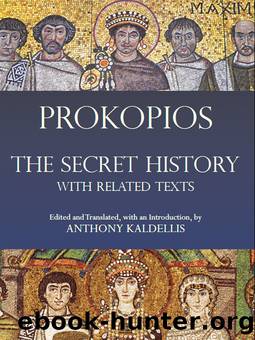The Secret History by Prokopios

Author:Prokopios
Language: eng
Format: epub
Tags: ebook, book
Publisher: Hackett Publishing Company, Inc.
Published: 2011-03-01T16:00:00+00:00
____________________________
1. Leon I (r. 457–474).
2. Bederiana was in the province of Dacia Mediterranea, near the city of Naissos (modern Niš) in the north-central Balkans, a region that had supplied the empire with soldiers for centuries. Its inhabitants could be called Illyrians or Thracians, which were only vague geographical labels. Justin (who was born around 450) is called a Thracian in other sources, and his companions have Thracian names. All were basically Romans.
3. Probably the palace guard known as the excubitores.
4. Anastasios (r. 491–518). Isauria, in southern Asia Minor, was not fully pacified. Also, Anastasios’ predecessor Zenon (r. 474–475, 476–491) had been an Isaurian and had appointed other Isaurians to high office. Many resented their loss of power and influence under Anastasios. The Isaurian War lasted throughout the 490s.
5. Yet the general had intended to execute Justin after the first night (according to 6.5 above).
6. That is, the dream-entity itself would make use of Justin’s family in the future (presumably in order to wreak havoc among human beings).
7. Justin was almost seventy when he came to the throne in July 518. The Chronicle of Ioannes Malalas confirms that Justin was “unlettered” (17.1). He was not, however, senile, at least not in 518. According to one version, Justin was given money by Amantios, the director of the palace staff (see 6.26 below), with instructions to secure the soldiers’ support for the accession of his associate Theokritos, but Justin used it to secure their support for himself instead. Amantios and Theokritos were executed in the disturbances that followed.
8. An epigram for Proklos calls him “the mouth of the emperor” (Greek Anthology 16.48). Prokopios calls him a just and unbribable man (Wars 1.11.11; see also 9.41 below). The professor of Latin and civil functionary Ioannes Lydos calls him “most just” (On the Magistracies of the Roman State 3.20). He held office between 522/523 and 525/526.
9. I.e., the stencil LEGI.
10. The imperial chancery had developed a special handwriting to be used in imperial documents, to prevent forgery (Codex Theodosianus 9.19.3). The imperial signature, moreover, was written in a special purple ink (Codex Iustinianus 1.23.6). The only surviving sample of the handwriting of an ancient Roman emperor appears on a papyrus containing an order from Theodosios II (r. 408–450) to a commander in Egypt.
11. Lupicina is a diminutive of lupa (“little wolf girl”), a name common among prostitutes in the Graeco-Roman world (cf. Lycisca in Juvenal, Satire 6.123). An independent contemporary source confirms Lupicina’s servile and barbarian origins. Upon becoming empress, she took the name Euphemia (see 9.49 and note 56).
12. Justinian was from the village of Taurision, near Justin’s village of Bederiana, where he later built the city of Iustiniana Prima (Buildings 4.1.17–28). Born in 482, he was a son of Justin’s sister and a certain Sabbatios (see 12.18 below); his full imperial name was Flavius Petrus Sabbatius Iustinianus.
13. Prokopios’ account of the Justinianic plague (Wars 2.22–23) is translated in related text 8.
14. This passage itemizes the main accusations against Justinian in The Secret History: innovation in government, murder, and theft.
Download
This site does not store any files on its server. We only index and link to content provided by other sites. Please contact the content providers to delete copyright contents if any and email us, we'll remove relevant links or contents immediately.
| Africa | Americas |
| Arctic & Antarctica | Asia |
| Australia & Oceania | Europe |
| Middle East | Russia |
| United States | World |
| Ancient Civilizations | Military |
| Historical Study & Educational Resources |
The Mysteries of Mithra by Cumont Franz(1365)
The Fall of Carthage by Adrian Goldsworthy(1319)
Sacred Britannia: The Gods and Rituals of Roman Britain by Aldhouse-Green Miranda(1166)
Letters from a Stoic (Classics) by Seneca(1052)
The Ghosts of Cannae: Hannibal and the Darkest Hour of the Roman Republic by Robert L. O'Connell(994)
Selected Political Speeches by Marcus Tullius Cicero(992)
The Satyricon by Petronius(981)
Fall of the Roman Republic (Penguin Classics) by Plutarch(977)
The Poison King: The Life and Legend of Mithradates, Rome's Deadliest Enemy by Adrienne Mayor(977)
Rubicon: The Triumph and Tragedy of the Roman Republic by Tom Holland(961)
Rome's Gothic Wars: From the Third Century to Alaric by Michael Kulikowski(952)
Hadrian and the Triumph of Rome by Everitt Anthony(899)
The Roman History by Cassius Dio(882)
In Defence of the Republic by Cicero(877)
Delphi Complete Works of Cicero by Cicero(828)
Letters from a Stoic by Seneca(823)
The Spartacus War by Strauss Barry(805)
Marcus Aurelius by John Sellars(803)
The Twelve Caesars (Penguin Classics) by Suetonius & Robert Graves(785)
